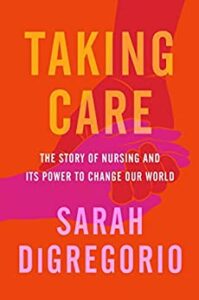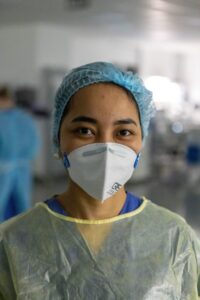


For years, I have been interested, fascinated by medicine, healthcare and all the science behind it. It is the reason I became an RN, and that I am always reading about advances in medicine, the ability of doctors, nurses and other healthcare workers to save and improve lives. Thus, I read with interest the New York Times review of recently published: TAKING CARE, the Story of Nursing and Its Power to Change Our World. The book was written by Sarah DiGregorio RN who asks the question: Can nursing be understood from the outside?
Though nursing is one of our oldest professions, DiGregorio maintains its history is not broadly known, writing: “nursing is a thread running through all of human history. And if you imagine that nursing arose only in relatively recent times as a profession dedicated to assisting physicians within hospitals, you have it backward. Nursing came first.”
In DiGregorio’s chapter entitled Dying, she discusses nursing care for the ill and dying, and for those who have already died. She stresses that nursing begins with birth, but it is present all through our lives. She reminds us that nurses service patients not only during birth, but also during death. Hospice care nurses are fully aware their patients will die, and in many ways provide even more comfort to the families of the patient, than the patient herself.
I will never forget when the decision was made to put my mother on Hospice Care. It meant doctor visits and most medications were discontinued. It meant that my mother did not have to go through interviews with a Medicare doctor…and at this point in her life, none of these events made sense anyway. My dear mother was always traveling in her mind, connecting with her sisters who had already died. And to have Medicare interview a dementia patient, ask her questions she could no longer answer, made no sense.
TAKING CARE also explores addiction, how nurses have been trail-blazers, opening clinics for drug addicts. She introduces us to L. Synn Stern, an RN who runs an overdose center in New York. Stern trains “harm reduction specialists” teaching them how to inject without causing damage to veins, arteries and other tissues. We meet Cicely Saunders who founded St. Christopher’s Hospice. Saunders says of an elderly man dying of cancer: “His pain…changed the course of my life and of history.” From him, Saunders began to understand and define total pain, which is a combination of physical symptoms, mental distress, social problems and the spiritual needs that come with dying. Should we not add mental illness, violence, poverty and loneliness as elements in people’s lives that make living so painful?
ROE V WADE
In her review of TAKING CARE, Christie Watson writes that the book never shouts. Adding: “There is a quiet anger on every page, especially in the wake of political shifts that render caregiving harder than ever. “With Roe overturned, abortion criminalized in some states, and other privacy-based rights in jeopardy, reproductive care in the United States is more threatened than usual. And nurses and midwives are again and always stepping into the breach.”
FINAL THOUGHTS
The author of TAKING CARE asks: “Can we be human without nursing?” And the reviewer in the NYT responds: “Indeed, if a measure of our society is how we treat the most vulnerable, then how we treat nurses is surely a measure of our humanity…”
“During the pandemic, nurses have been asked to work without proper protection and have often been the only witnesses to death after death. Some nurses even died as a result of exposure at work.”
Thus Watson concludes: “Nursing is a language with many accents…It is science and art, it is physiology and pharmacology and advocacy and ethics and biology and story and sociology and philosophy.” At the end of her review, Christie Watson concludes: “Taking Care reminds us that perhaps more than ever before, nursing is politics.”
Thanks to Healing the Unsung Healers the New York Times, June 18, 2023, reviewed by Christie Watson

3 Responses
Thanks, Beth!
Excellent article. I’m always glad to read about Jini (and Margaret & Lucia), even though it was about the end of a magnificent life.
Thanks again!
Love,
Ray
I can’t begin to express how much I admire nurses. From having babies in hospitals, to getting checked up at the doctor’s office, nurses have always been a calming, knowledgeable presence. Truly love them.
Thanks, Laurie, and thanks for reading, Beth